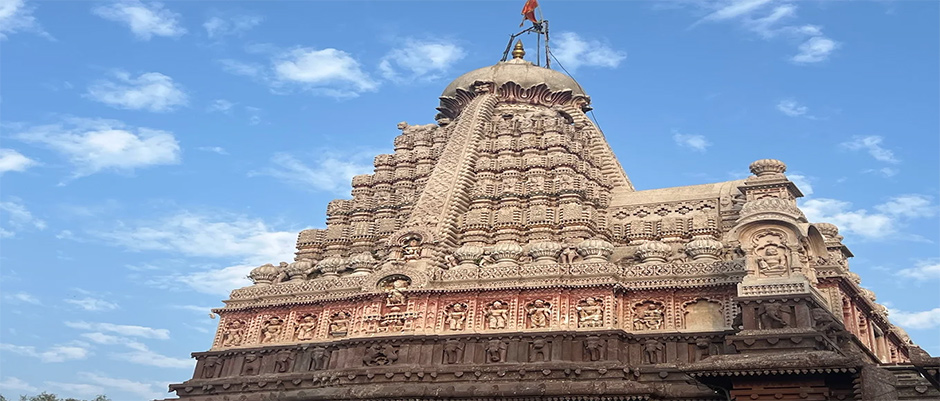
Grishneshwar Jyotirlinga
Grushneshwar Jyotirlinga – The Flame of Compassion
Tucked away in the peaceful village of Verul, near the majestic Ellora Caves of Maharashtra, lies a sacred abode of Lord Shiva — the Grushneshwar Jyotirlinga. Revered as the twelfth and final Jyotirlinga among the Dwadasha Jyotirlingas, this temple is not only a place of deep spiritual power but also a testament to devotion, forgiveness, and divine grace.
Located around 30 kilometers from Aurangabad and nearly 300 kilometers from Mumbai, this temple holds profound importance in Hinduism. Just a short walk from the historic Ellora caves, Grushneshwar stands as a beacon of ancient wisdom and unwavering faith.
The Name that Radiates Mercy
The name Ghrneshwara comes from the Sanskrit root “ghrna” which means compassion. True to its name, this is where Lord Shiva is worshipped as the Lord of Compassion — one who forgives, one who listens, and one who stays close to the hearts of his devotees.
History That Withstood Time
The temple has seen centuries of rise, fall, and resurgence. Initially destroyed during invasions in the 13th and 14th centuries, it was brought back to glory by Maloji Bhosale, the grandfather of Chhatrapati Shivaji Maharaj. The temple saw its final restoration in the 1700s, when Queen Gautama Bai Holkar of Indore extended her support to rebuild it to lasting glory. Today, it is protected as a national heritage site and attracts countless pilgrims each day.
In accordance with local traditions, male devotees entering the sanctum sanctorum (garbha-griha) must do so bare-chested, symbolizing humility and purity in Shiva’s presence.
The Sacred Legend of Ghushma’s Devotion
Long ago, in the region near the Devgiri hills, lived a devout Brahmin named Sudharma and his wife, Sudeha. Though they had all comforts, one sorrow shadowed their lives — they had no children. After learning that Sudeha could not bear a child, she convinced her husband to marry her younger sister, Ghushma.
Ghushma was a woman of rare virtue and deep spiritual practice. Every day, she would make 101 earthen Shivalingas and worship them with unwavering devotion. Moved by the depth of her devotion, Lord Shiva granted her the joy of motherhood with the birth of a radiant son.
Joy returned to the household, but jealousy soon consumed Sudeha. Blinded by envy, she committed a dreadful act — one night, she murdered Ghushma’s son and threw his body into the pond where Ghushma immersed her Shivalingas daily.
At dawn, when the news broke, grief struck everyone — except Ghushma. With calmness rooted in divine faith, she continued her daily worship as if untouched by the tragedy. After her prayers, she went to the pond. And there, emerging from the waters, was her son — alive and unharmed.
In that moment, Lord Shiva himself appeared before her. Filled with rage at Sudeha’s sin, He was ready to punish her. But Ghushma, with folded hands, pleaded for mercy.
She said, “O Lord, if you are truly pleased with me, then please forgive my sister. Let no curse fall upon her. My son has returned — what more can I ask? Rather than punishment, I pray that You stay in this sacred place and offer Your divine presence for the good of all who come here.
Overcome by her compassion and purity, Shiva granted her wish. From that moment on, He manifested at that spot as Ghushmeshwar Jyotirlinga, named in honor of the noble devotee Ghushma.
A Living Flame of Faith
Grushneshwar is not just a temple; it is a living example of how devotion, forgiveness, and divine love can transform fate itself. Every devotee who bows here is reminded that Lord Shiva is not distant or harsh — He is Ghrneshwara, the compassionate one who resides where pure hearts call Him.
Grishneshwar Temple Timings
Daily Opening Hours:
Tuesday to Friday: 6:00 AM – 10:30 AM and 1:30 PM – 7:00 PM
Saturday, Sunday & Monday: 6:00 AM – 9:00 AM and 2:00 PM – 7:00 PM
